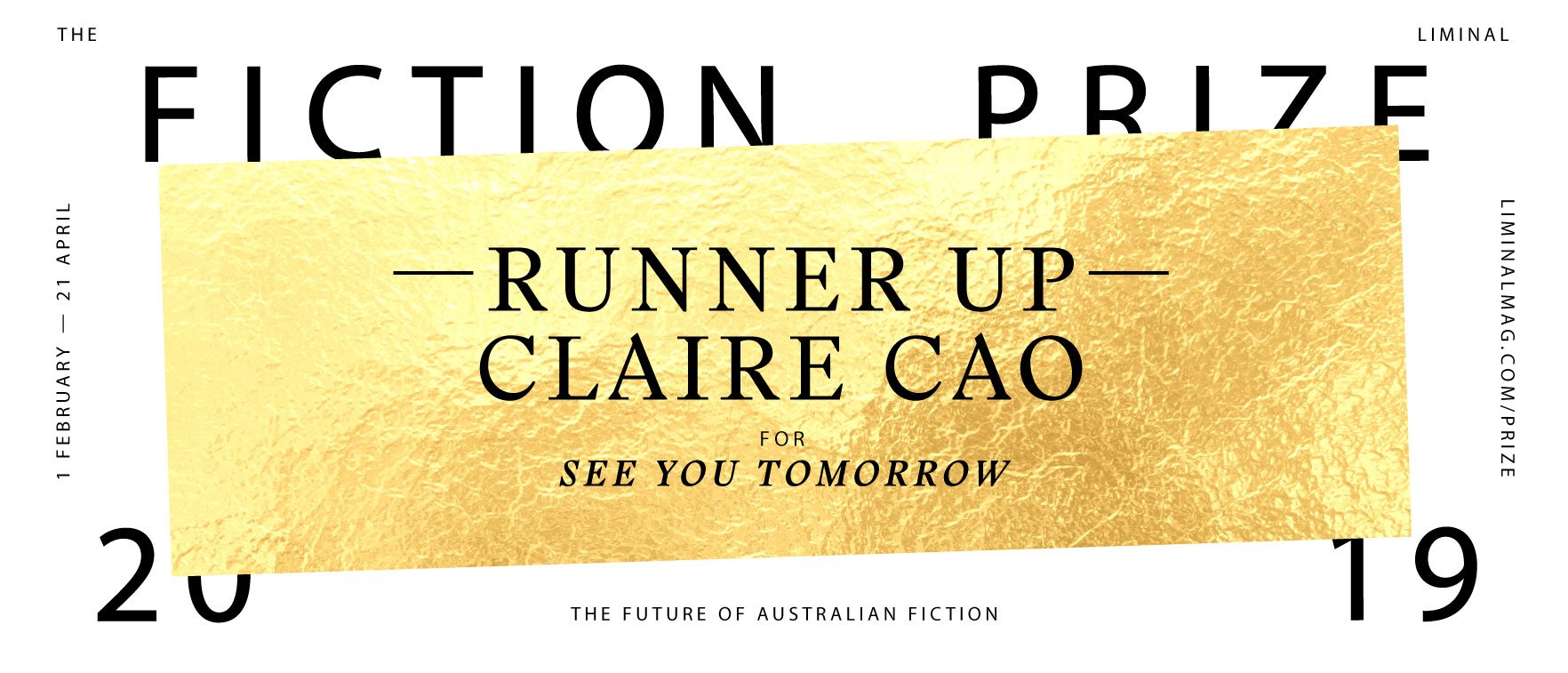5 Questions with Claire Cao
Claire Cao is a freelance writer from South-West Sydney who has an avid passion for soupy dumplings and B-movies. Currently, she is stumbling through a Law/Arts degree at UNSW and is a member of Sweatshop: Western Sydney Literacy Movement. You can read some of her writing at: SBS Life, The Lifted Brow, Rough Cut and Voiceworks.
Claire is the runner-up of the inaugural 2019 Liminal Fiction Prize. She tells us a little bit about herself and about writing her story, ‘See You Tomorrow’.
Read ‘See You Tomorrow’ in our anthology, out with Brow Books in 2020.
Tell our readers a bit about ‘See You Tomorrow’!
‘See You Tomorrow’ follows a fanny pack-wearing grandma named Li Xuan from Cabramatta, as she prepares to go on a lunch date with someone from her childhood that she hasn’t seen in over fifty years. Her grandson, who is staying with her under ambiguous circumstances, is convinced this person is an old flame. When she eventually meets up with her old friend—a woman named Ru Lian—a simple yum cha meeting unlocks a wave of memories of being a teenager in Kunming, where she met Ru Lian during a great flood. The story ends up covering that fifty-year span of feelings, displacement and confusion.
What inspired ‘See You Tomorrow’?
I was hitting a lot of walls with other ideas and decided to just write something that I wanted to read. ‘See You Tomorrow’ is an amalgamation of my obsessions—teen romance films, dim sum, intergenerational family relationships and the explorations of elderly people and their interiority.
I think queerness is a topic that’s regularly avoided in the Chinese community amongst our elders, and I feel like there’s a dearth of stories about this entire generation of people who never had the tools to express their feelings. The story is inspired partly by this 2014 film called Lilting, because it kicked off my obsession with the disconnect between younger generations and the older family members they love, and the attempts to bridge that.
Movies have a huge impact on my writing process in general! I think so many films put me in a particular mood where I hang on to a striking image, or a gesture, and my own story ideas bloom around those moments. I’m also really inspired by so many other writers — both through the joy and new perspectives their prose brings me and their bravery in putting out writing that challenges systems of oppression. In particular, I talked a lot of the ideas in ‘See You Tomorrow’ through with the other wonderful women from the Citizen Writes Project.
When did you first decide you wanted to become a writer?
I’ve wanted to be a writer for a while; I have this elaborate fantasy world plotted that I’ve been dedicated to since childhood (it started off very derivative and was basically Howl’s Moving Castle/Spy Kids/A Series of Unfortunate Events/Van Helsing fanfiction).
That desire was really nurtured during my teens through communities on Tumblr and the friends I made there — this was the stage where I didn’t really think about my writing critically and wrote with abandon which was not so great for my growth, but great for creating this association in my mind that writing was innately fun and playful. I still think that the escapist, highly emotional and trope-filled stories I read and wrote during this time are important to writing: we live in such a chaotic, absurd world and I think it’s important that writing breaks through and touches people.
I started taking writing more seriously in the last year or so mainly because of two organisations based in Western Sydney — Co-Curious and Sweatshop: Western Sydney Literacy Movement. Before joining them, I rarely wrote about people from my community and certainly not stories set in Western Sydney because I thought no audience would be interested. But the wonderful people I’ve met in these groups showed me how empowering it was to write stories about those who are often erased; the rich, wide-ranging scope of stories from other Westie writers showed me how writing is so central to endangering empathy and destroying long-standing, harmful narratives that rule the mainstream.
How do you make time for writing?
I’m currently in my final few terms of a Law/Arts degree at UNSW and also work as an English tutor for a handful of high school students. I’m lucky because tutoring is a pretty flexible job but trying to get writing done with a full-time course load is exhausting. I’ll always likely end up neither studying or writing, but watching a terrible show on Netflix to procrastinate instead.
When I have an idea I’m passionate about, I do end up having a very single-minded focus on carving out time for writing. I’ve been trying to nurture those ideas by being more observant of the world around me and taking the details down in my journal/phone, while also spending all my time on public transport reading. Then, when an idea takes hold, a lot of writing is done between classes or at libraries where I know I won’t be distracted.
What can we expect next?
I’ve been trying to focus on doing more film criticism, some of which you can read on the MIFF blog! I’m also working on an ongoing screen project for Co-Curious’ Behind Closed Doors program, which features eight stories by eight writers from Western Sydney, which I’m really excited about. Other than that, much time is spent staring at my ceiling until a new story idea comes along.
I was hitting a lot of walls with other ideas and decided to just write something that I wanted to read.
Find out more


